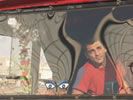Eye For Film >> Movies >> Bosta (2005) Film Review
After a 12-year absence, writer/director Philippe Aractingi returns to Lebanon to make Bosta, the first Lebanese musical made since the country's civil war. In the film, Kamal (Rodney El Haddad) also returns to Beirut after 15 years of exile in France to bring together the dance group he formed back in high school. Not only does he try to assemble his old team, who have drifted from music and dance over the years, but he also adds some Western touches to the traditional music, which is hard at first for people to accept.
This film is about Lebanon taking its first steps towards the future instead of dwelling on the past. Refreshingly, Bosta is a road movie about the recovering country after the war, rather than about the war itself, and includes several metaphors to convey this rejuvenation or transformation in Lebanese culture. The group paints and uses their old school bus, which has survived the war, to go around the country to perform. The old bus represents their old heritage and how it can be restored with some minor alterations, enabling it to become a vehicle to bring together people from different ethnic and religious backgrounds.

Kamal takes the Lebanese national line dance, Dabke, and adds modern moves and modern music to it. After they enter a Dabke competition, the judges accuse them of destroying the little heritage they are left with after the war. Kamal responds by saying that Dabke, like Lebanon, is alive and breathing, so it is capable of changing like everything else. This innovative move, the fusion of traditional music with techno and hip hop, although rejected at their first couple of performances, is finally understood in their performance at a wedding. The wedding symbolises bringing together and connecting — the same thing the new music and dance is supposed to do: bring together and connect the traditional with the modern.
The film is full of well-known actors, including the beautiful director/actress Nadine Labaki and El Haddad, co-writer of one of the most famous Lebanese films of this year, Caramel. They both offer very lively performances and help to carry the story forward. The film, although made on a modest budget, has been quite well received and is a box office hit in Lebanon and other parts of the Middle East.
Combining the serious and the cheerful, Bosta portrays both the beauty and the problems of Lebanese society. The film take us to the Lebanese countryside and into different regions, introducing us to the various cultures existing throughout the country, which, although different, all share the love for Dabke — yet another metaphor for bringing the Lebanese together as a nation. Filled with vivid cinematography, the film is quite entertaining, and the song and dance scenes combined with a love story subplot make it even more fun to watch.
Reviewed on: 22 May 2008


















